Might a bilingual education be the best preparation for a bicultural child, whose playing field covers more than one country? Perhaps, if you are in the position to take advantage of it. The reality is that some of us aren’t.
When in Rome Do as the Romans Do
As much as we may want to, we can’t pick up and move back to our home country. What to do?
The key is trusting an educational system. Sometimes it is hard to do this, I know. In France, my kids have suffered from long school days, inconsistent quality of teaching, and teacher absenteeism, despite carefully choosing our schools. I remind myself, however, that France, as a nation, scores high. Micro-managing takes power away from those responsible for delivering a result. Trust the French educational system and let its qualified people deliver.
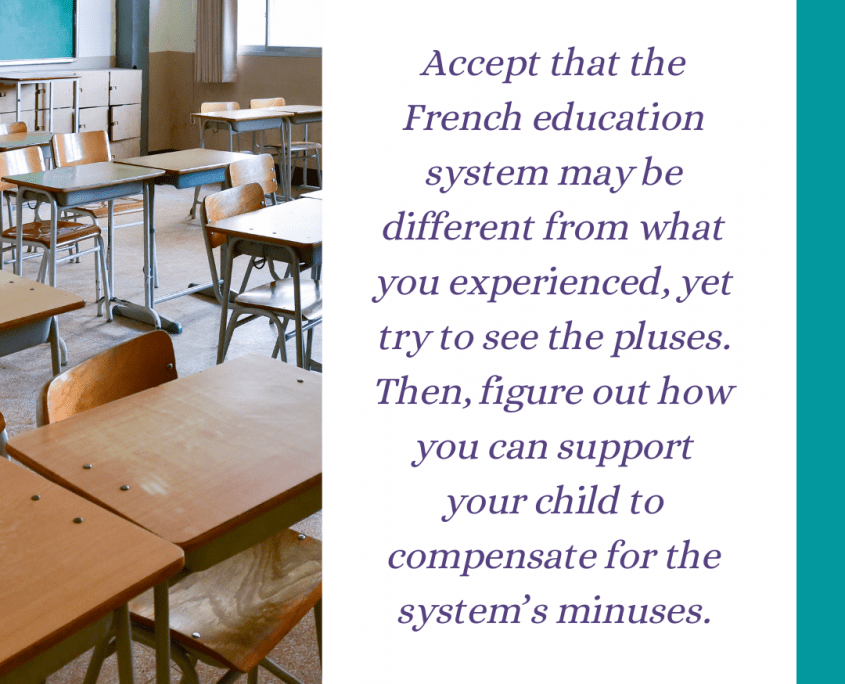
And Find Common Ground
When parents from two different countries hold a different view of education, perhaps the best they can hope for is to find some common ground. I remember being horrified by the inhumanity of my son’s 0/20 on a dictée (my French husband didn’t bat an eye), yet delighted that each vacation his French teacher assigned an enjoyable short novel to read. We both agreed that valorizing reading was a good thing.
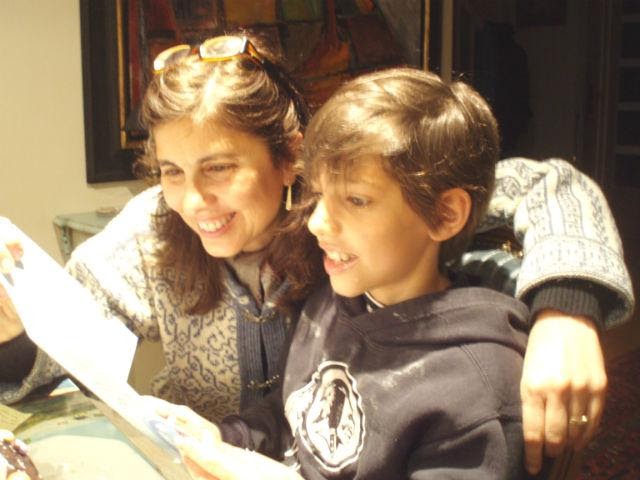
Accept that the French education system may be different from what you experienced, yet try to see the pluses. Then, figure out how you can support your child to compensate for the system’s minuses – for example, by: providing tutoring, ensuring an environment at home conducive to studying, being available to listen to your child when they need to talk, finding other ways to build your child’s self-esteem, meeting teachers to advocate for your child, or offering your child plenty of patience and encouragement.
Do note that the worst thing that we can do for our children is to undermine them by forcing our worldview on them. A non-French worldview is of limited use when studying in a Francophone system! It is confusing and can even give our children an excuse not to engage when things get challenging, prohibiting them from reaping one of the benefits of the French educational system: learning how to survive when the going gets tough. We must support our kids as needed without bashing their school system, because it is theirs, and their identity is tied to it.
Even you can learn to work with the French school system
Our then-12-year-old boy’s French math teacher got into the habit of calling him “et demi” or “1/2” when he did his daily headcount. I asked for a meeting and began it by telling the teacher that I appreciated his dedication – he was rigorous, even collecting his students’ notebooks to give them feedback on their note taking. Then I asked him to stop calling my son “et demi” because it was destroying his confidence and making him lose face in front of his classmates. The teacher was surprised and said he liked my son and was just teasing. I said I knew that he was the kind of teacher that could build a student’s confidence, and that I hoped that he would do that for my son. And guess what? He did!
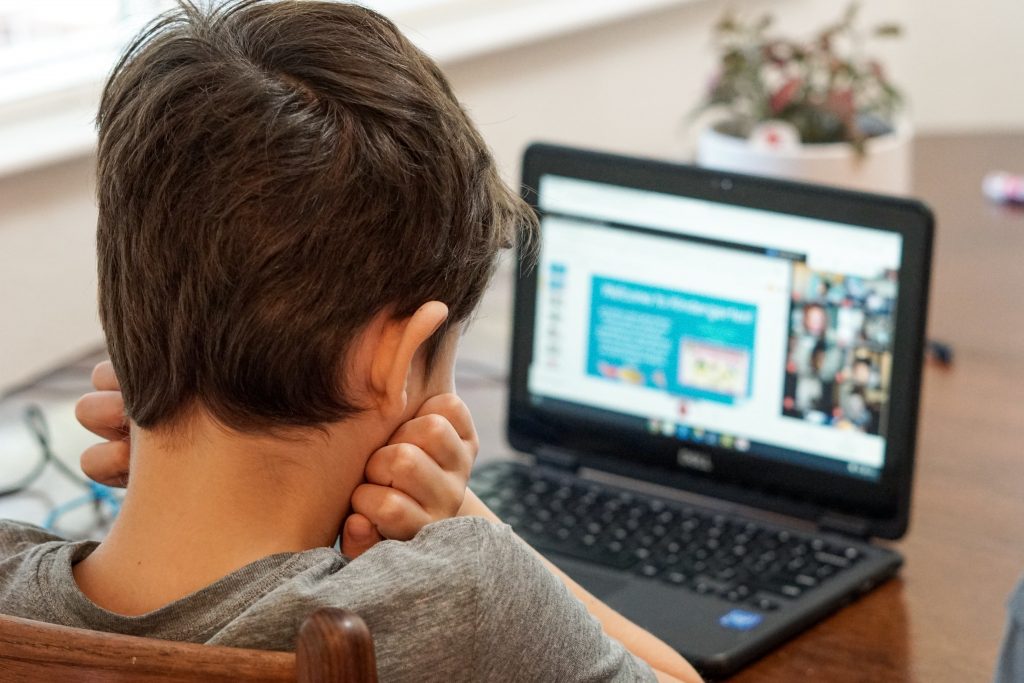
When advocating for your child, avoid generalizing. Better to offer the teacher feedback on a specific event, and if appropriate, propose a solution.
When the French school system is failing your child
Sometimes, trust, support, and advocacy may not be enough. If your child is still struggling in a French school, should you put your child in a non-French system? After all, in France, in addition to international schools, there are German, Spanish, British, American, Montessori, and Euro schools. The decision is – of course – full of nuances. Yet you must weigh the potential benefits to your child’s well-being against the impact of taking them out of the French system, in particular if they have a French parent. Full mastery of French, your child’s future network, and the lack of a French Bac diploma are all issues to consider.
Know that within the French education system, there is choice. There are public and private schools, Catholic and other religious schools. There are international schools and bilingual schools. There are bilingual and European programs within public, semi-private, and private schools. There are after-school language schools, schools for dyslexics, boarding schools, and international exchange programs. There are general, technological, trade, sports, art, and performing arts high schools.
Might most kids, in fact, be OK in any school system?
If you raise your children in France, and you learned that your child was offered a spot to attend Lycée Louis-le-Grand or Henri IV, you would probably jump for joy at the news – regardless of your nationality. Indeed, students at these prestigious French schools are on track to secure their spot among France’s elite. What if your child benefited from a bilingual education up until that point, could they make the transition into an elite French school?
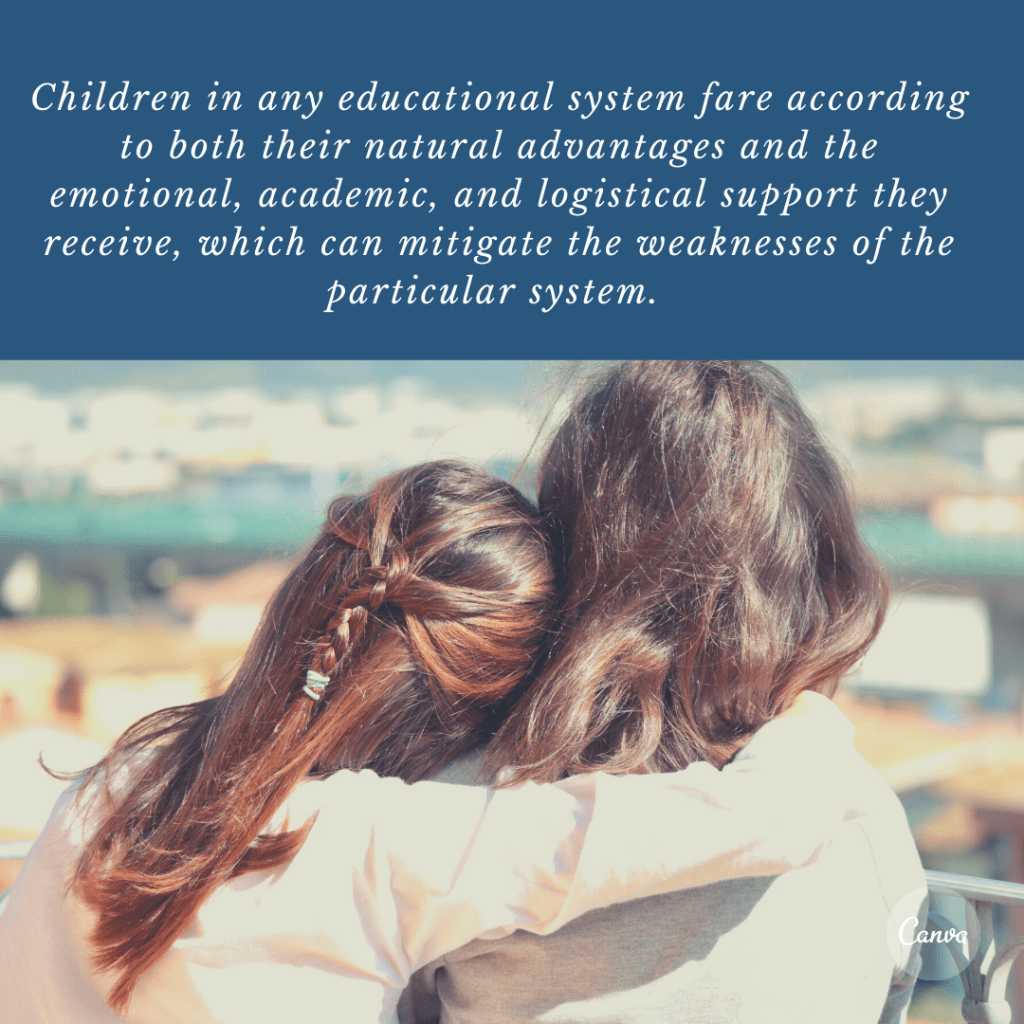
Well, many transition in just fine. I know a Franco-Brit who thrived in his public high school’s bilingual program and decided to forego his place in a British university in order to enter a Henri IV prépa – and he is thriving.
A dyslexic Franco-American student attended French Catholic primary school and benefited from years of reimbursed French language therapy. He entered a bilingual public middle school program and eventually ended up in a US college with a scholarship. A Franco-British student attended a bilingual Montessori nursery school, and then spent the next 12 years in the French Catholic and public school system. Once graduated, she headed to England for a Foundation year and more, and is flourishing.
While this evidence may be anecdotal, it begs the question: from our children’s point of view, if they receive the appropriate support, does it really matter to which system they belong? Does it really matter how you skin the cat?
How parents can make the educational system work
Children in any educational system fare according to both their natural advantages and the emotional, academic, and logistical support they receive, which can mitigate the weaknesses of the particular system. Dear parent, please be honest. How are you engaging with your child’s education? If you have a child who finds school difficult, how are you accompanying them?
Are you in denial…about any number of things? Are you focused on your career and struggling to find time to deal with your child’s challenges; or, are you unwilling or unable to deal with them? Are you resistant to reorganizing weekends and vacations in order to provide your child with the structure, rest, and extra time they may need? Are you projecting your own “a priori” upon your child? Are you unwilling to go to conflict?
A “yes” answer to any of these questions may be what is failing your child, even more than the educational system. Dear parents, our job might be the hardest one out there. And we have just 18 years to get it right. Bon courage.
Jane Mobille, PCC
Jane Mobille is a Professional Certified Coach who counts young people and families among her clientele. She and her husband have raised three bicultural children in France. They have attended semi-private bilingual school, public nursery school, Catholic primary school, and public secondary school with international sections. Two of them struggled for many years before encountering success.
This article was previously published on the INSPIRELLE blog.


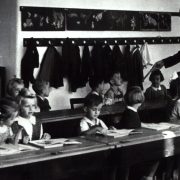







Leave a Reply
Want to join the discussion?Feel free to contribute!